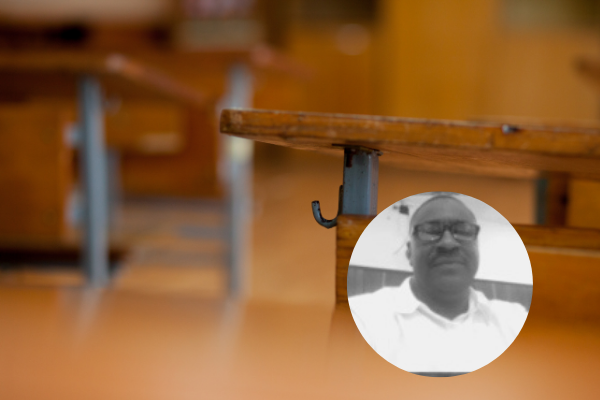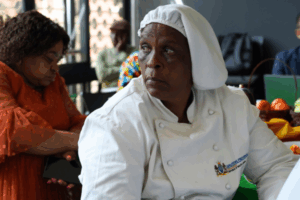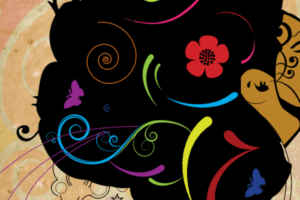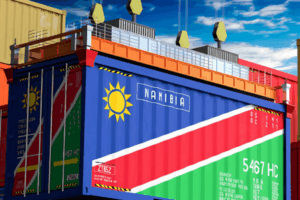In September 2019, 19 trade union activists and four Gender at Work facilitators involved in The Education Unions Take Action to end School-Related Gender-Based Violence in (SGRBV) initiative sub-Saharan Africa participated in a creative writing process to produce 23 inspirational stories narrating their journey in the work of addressing social norms that perpetuate gender-based violence in schools. The SRGBV initiative is part of a decades-long quest by global teachers’ union Education International (EI) and UN Girls’ Education Initiative (UNGEI) to advocate for the advancement of gender equality in the education sector and trade unions.
The following is the story of Ebrima Sajaw (pictured inset) of The Gambia Teachers Union.
The story I want to write about is between my humble self and my beautiful Fula wife called Fatoumatta. I met Fatoumatta in 1988 while I was on a posting in her village teaching. Her beauty attracted me. So, I decided to approach her and eventually asked her if she would be the queen of my life, but only under one condition, that is, if we are blessed with a girl child, she’d not undergo female genital mutilation (FGM). In our tribe, people believed that every girl child must undergo the horrible and degrading act. However, her response was let’s wait until that day comes.
The knot was tied and we became husband and wife. Later, we were blessed with two girls. Gass was five years while Abbie was three years younger. We were all living happily. One day while together on the bed, my wife said to me that it’s now time to circumcise our girls. I was so shocked to hear her utter such words. I told her never to utter those words again. Then she started to cry and make all kinds of noise. I just couldn’t sleep because I wasn’t expecting it from her, but I was ready for the challenge.
To my surprise, the day had been set by the community for the girls to be circumcised without my knowledge. While in the village, a friend of mine called Ousman asked me whether I was through with the necessary preparations for my girls. In two weeks, his girls were also going and he was really happy about it. I told Ousman my girls weren’t going anywhere. He told me I was a disgrace to the community for ignoring my traditional responsibilities. Before I could respond, he slapped my face hard and walked away. I said to myself that the real fight had begun. When I reached home my entire family was waiting for me. My mum, dad, in-laws, neighbours and relatives far and wide came to advise me to let my girls go through female genital mutilation because it would make them better women when they grow up. Then I asked my wife Fatoumatta; “Has it made you a better woman? You have undergone a series of operations, pains and nearly died due to complications during the delivery of both of my girls. And now you are not allowed to conceive anymore or else you will lose your life.” I told them that the practice was unhealthy and I would die for my girls, no matter the consequences. They said I’m stupid, ignorant, poisonous and a disgrace to my tribe. My dad said that he is commanding me to allow my girls or else the customs and norms of my entire family would be killed. I was so angry, I couldn’t control my emotions. I told them to go to hell with tradition. As far as I was concerned the others should not allow their children too but I don’t have the power to stop them. But as long as I was alive my girls weren’t going anywhere.
Fatoumatta became frustrated due to the pressure because people blamed her for doing too little to convince me, her husband. She decided to insult me, refusing to cook because she thought that by irritating me I would give in.
One evening I was reading and a village elder came to me with a message that I should report to the council of elders in the village because my wife reported that I said FGM has no relevant effects on girls and that in fact, it causes more harm than good. They said this was insulting and that I was ignorant. Fatoumatta was happy when she heard that I was going to answer to the elders because she thought I would now give up. When I reached the elders I was asked to repeat the exact words I had mentioned to Fatoumatta, which I did. They called a girl to narrate the effects of FGM while I listened attentively to prepare myself to respond. This girl was called Jainaba. She mentioned that what they removed from her helps her body not feel any sensation for boys unless she is married. I told them that it is nonsense because there are girls who go through FGM and end up losing their lives due to complications from FGM. I told them that in the cities, 90% of girls have never been through it. They are healthy and living fine. Why can we not be like them? They concluded I was insane. They wondered why a man in their community was behaving like this because men are always in the front to see that FGM is done. I told them I have the feeling we are all born complete. “OOOh! No! oooh! No!”, they replied.
There are girls who go through FGM and end up losing their lives due to complications from FGM. In the cities, 90% of girls have never been through it and they are healthy and living fine. Why can we not be like them? The elders concluded I was insane.
Eventually, while I was at work a friend and neighbour called Ousman came to inform me that he had seen my wife taking my girls along with others to be circumcised. I couldn’t hold my breath. I nearly fainted and prayed to God to protect them before I arrived. I took permission from my boss and headed by taxi straight to my father in-law’s house. The way I banged on his door, Kebba, my father in law, nearly insulted me. I asked Kebba to tell his wife, Binta, who was the leader of the group of elders conducting FGM in the community, to bring back my girls without anything happening to them. I told Kebba to go to hell with their beliefs. Kebba was so angry that he started to tremble. He said Fatoumatta told them that I consented for my girls to be circumcised. I responded back, God forbidding, that if I don’t get my girls back I will make life miserable for him.
Immediately Kebba sent for Binta. When Binta, my mother in-law came and saw the state I was in, she nearly ran for her life but Kebba asked her to bring Gass and Abbie immediately. She said that her and my wife had done their final sacrifice and the girls are just awaiting their turn, and that being the case it can’t be reversed. I told Binta that if anything happens to my daughters I will report both her and my wife and kill myself. So Binta had no other choice but to go and fetch my girls, although she felt that she nearly lost her own life for snatching the girls unnoticed. I was really surprised to get my girls naked but safe and sound. Binta was the champion of the crusade of these barbaric acts inflicted on innocent girls who were unaware of their rights to resist their parents’ decisions due to their tender age and traditional beliefs. Girls lose their lives in the process often.
Fatoumatta was tormented because my girls were the laughing stock of the community. Most of the people disassociated themselves from my family, especially from my wife who cried almost every day because of frustration from her peers. Most of the men said that I thought that my family is better than theirs because of the western education I went through and that I saw them as uncivilised and ignorant. No matter the pain, embarrassment, insults and disconnection, I raised my head high among my peer groups. There was a time when my colleagues asked me to vacate the village and go to the city. I refused because I wanted to see FGM being eradicated slowly but surely.
Abbie could not understand why I didn’t allow them to be circumcised with their peer groups and their mom kept on telling them to speak to me, especially whenever she was depressed. I told Gass and Abbie that they are too young to understand but that time would tell. In school, their peer groups always told them that they will end up being lonely and no man will ever marry them because they are not clean and pure. I advised them to concentrate on their education and avoid these conversations and then they would be better people.
Binta, my mother in law, felt under great pressure as the leader of the custom. Binta had inherited female circumcision at a tender age from her grandmother and she was initiated by the community, with the warning that if she betrayed the cause she would die miserably. Some months after she had fetched my girls, Binta became severely sick. My wife told me her mum is going to die because she betrayed the cause by withdrawing her grandchildren. At first I thought that it was a joke and I didn’t want to visit her. When I realised it was serious, I went to visit her. I wanted to take her to the city hospital for treatment but she told me her illness has nothing to do with doctors. She held my right hand and asked me to please take good care of her only daughter to whom she would have passed on her traditional inheritance to continue her legacy, but I had said God forbid. Little did I know that Binta was breathing her last breath. I felt her hand dropped off from my hand and I lost control of my tears. I never knew that I was fighting a worthy cause for Gass and Abbie until one day I heard something on the news about gender-based violence (GBV) and a talk about the abuses inflicted on women and girls.
I was so happy and called my girls to come and listen but they could not comprehend what the news was about. I invited Fatoumatta to listen. I didn’t blame her because she was not exposed to the city. The message I heard motivated me to do more to save girls from FGM. I knew it would not be easy due to the beliefs which were laid down by our ancestors but we have to venture into better practices.
Luckily I was invited to attend a workshop on School-Related Gender-Based (SRGBV) violence. I wondered first what it was all about but I was blessed to know that I am an activist. And more is expected from me now that I am a member of the peer learning and the change team. I also have more support than ever before.
There is SRGBV in our schools which is affecting students, teachers, communities and most of the time it is under the carpet due to poverty, stigmatisation and cultural barriers. With the knowledge gained I decided to be the voice of the voiceless to combat the horrors of FGM.
Moreover, I started to sensitise Fatoumatta. I was surprised when one day she suddenly gave in and hugged me, with the girls, and told me how she wished I was her father when she was young, to protect her from undergoing FGM. She remembered two of her peers who died in the process because they bled to death. She said that they celebrated FGM just because they were ignorant of the bad practices due to traditional beliefs. She apologised to me and the girls for not being aware earlier but that it was better to be late than never.
Fatoumatta was now ready to join me in the crusade to eradicate the bad practices of FGM along with Gass and Abbie, without being afraid of the challenges in the community. We were insulted when we first started the sensitisation on FGM, but I was the rock of the family despite all the threats to kill us. I had prepared my family for everything.
As The Gambia Teachers’ Union (GTU) we were able to create centres for women and children to come for counselling with trained GTU change team members. We have platforms for the voiceless to be heard. We have also trained GTU School Representatives on SRGBV in each cluster, and they, in turn, form school Clubs and dramatise the effects of SRGBV.
Schools have secret boxes where Teachers and students can post written notes about their ordeals in the school and community. These boxes are checked weekly and the cases are reported to the change team members. Schools also have drama clubs that sensitise students and community members.
Bantaba is a local setting where people from different backgrounds come together to speak out openly of their ordeals after being sensitised and counselling is given to victims and perpetrators. School clubs sing local songs on SRGBV for better understanding of the message. We engaged the National Television (GRTS) which gave the change team several slots on SRGBV for wider coverage. Media outlets were sensitized and asked to spread the message in both electronic and print media.
I use the school assembly on Mondays and Fridays to address the whole school on all forms of SRGBV. I give examples of corporal punishment, name-calling such as calling the girl child ‘my wife’, practices such as making girl children do domestic work. The teachers have given me the name Mr SRGBV. Similarly, I can inspire others who are the perpetrators to stop the act of FGM on our girls. To my surprise, I have helped men to take the lead in telling their spouses to stop encouraging their peers to venture into such practices.
Yes, it has just begun, but I know we will be victorious one day for sure. This is my purpose – to break the culture of silence, to break boundaries and fight the stigmatisation of the girl child concerning all aspects of SRGBV.
The views, opinions and words written in the article are solely those of the author. The article reflects the author’s journey, viewpoint and progress in their own words. The series of SRGBV initiative stories were co-developed by EI, UNGEI and Gender at Work.







